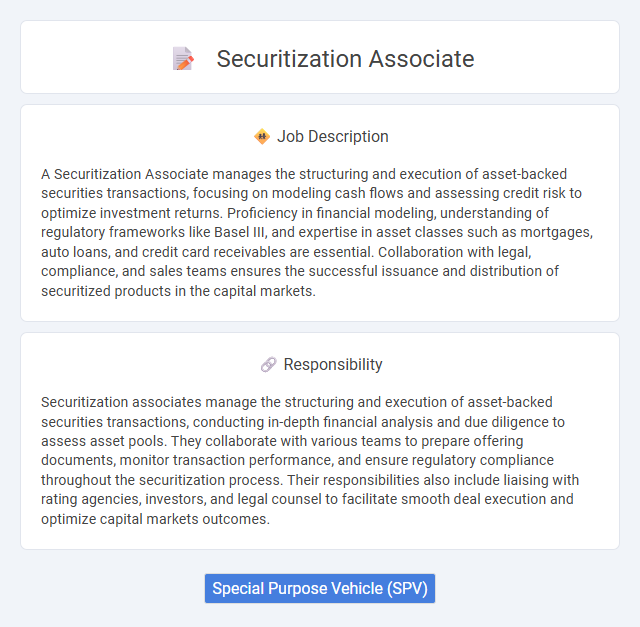
A Securitization Associate manages the structuring and execution of asset-backed securities transactions, focusing on modeling cash flows and assessing credit risk to optimize investment returns. Proficiency in financial modeling, understanding of regulatory frameworks like Basel III, and expertise in asset classes such as mortgages, auto loans, and credit card receivables are essential. Collaboration with legal, compliance, and sales teams ensures the successful issuance and distribution of securitized products in the capital markets.
Candidates with strong analytical skills and keen attention to detail are likely suitable for a Securitization Associate role, as the job involves managing complex financial transactions and risk assessments. Individuals comfortable working under pressure and with tight deadlines may thrive, given the fast-paced nature of securitization processes. Those who prefer routine tasks or lack proficiency in financial modeling and regulatory compliance might find the role challenging.
Qualification
A Securitization Associate typically requires a bachelor's degree in finance, economics, or a related field, with strong analytical and quantitative skills essential for evaluating asset-backed securities. Proficiency in financial modeling, data analysis, and an understanding of capital markets and regulatory frameworks are critical for success in this role. Experience with securitization processes, legal documentation, and risk assessment enhances the candidate's ability to support structuring, execution, and monitoring of securitization transactions effectively.
Responsibility
Securitization associates manage the structuring and execution of asset-backed securities transactions, conducting in-depth financial analysis and due diligence to assess asset pools. They collaborate with various teams to prepare offering documents, monitor transaction performance, and ensure regulatory compliance throughout the securitization process. Their responsibilities also include liaising with rating agencies, investors, and legal counsel to facilitate smooth deal execution and optimize capital markets outcomes.
Benefit
A Securitization Associate role likely offers significant career growth opportunities by providing hands-on experience with structured finance and risk management. This position may enhance analytical skills and deepen understanding of complex financial instruments, which could increase marketability in the finance sector. The job might also offer exposure to high-profile transactions, potentially leading to valuable industry connections and professional development.
Challenge
Working as a Securitization Associate likely involves navigating complex financial models and regulatory requirements, presenting significant analytical challenges. The role probably demands strong attention to detail and the ability to manage large volumes of data accurately under tight deadlines. Successfully handling these challenges may improve problem-solving skills and deepen expertise in structured finance.
Career Advancement
A Securitization associate plays a crucial role in structuring and managing financial assets for optimal investment returns, driving expertise in credit analysis, portfolio management, and regulatory compliance. Mastery in data analysis tools and deep understanding of capital markets enhance prospects for advancement to senior analyst, portfolio manager, or risk management roles. Continuous professional development, including certifications like CFA or FRM, significantly accelerates career growth within investment banks, rating agencies, and asset management firms.
Key Terms
Special Purpose Vehicle (SPV)
A Securitization Associate plays a critical role in structuring financial transactions involving Special Purpose Vehicles (SPVs) to isolate assets and optimize risk management. They analyze asset pools, prepare transaction documents, and coordinate with legal, compliance, and rating agencies to ensure the SPV operates within regulatory frameworks. Proficiency in financial modeling and knowledge of regulatory requirements are essential to facilitate efficient asset-backed securities issuance through SPVs.
 kuljobs.com
kuljobs.com